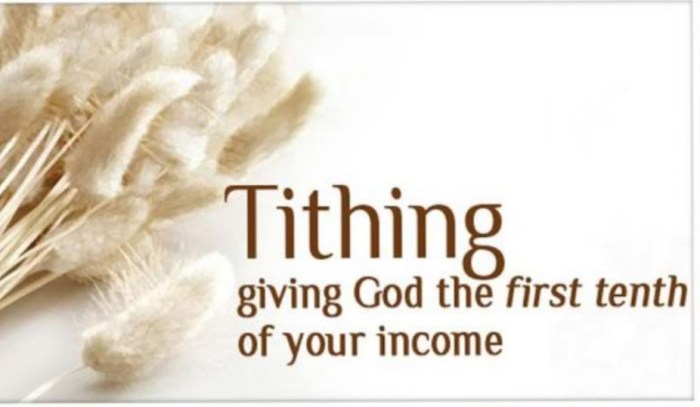Embarking on a profound exploration of pledging a tenth to church crossword, this analysis unravels the intricate tapestry of its biblical foundations, historical significance, and contemporary relevance. From its roots in ancient religious practices to its enduring role in Christian stewardship, this discourse delves into the multifaceted nature of tithing, examining its spiritual, financial, and ethical implications.
Throughout history, tithing has been a cornerstone of religious devotion, serving as a tangible expression of gratitude and obedience. This introductory paragraph sets the stage for a comprehensive examination of the concept, exploring its origins, evolution, and impact on individuals and communities alike.
Definition of Pledging a Tenth to Church

Tithing is a biblical practice involving the voluntary offering of a tenth of one’s income to the church. This concept is rooted in the Old Testament, where God instructed the Israelites to give a tenth of their crops, livestock, and other possessions to support the priests and the Temple (Leviticus 27:30-32).
In the New Testament, while there is no explicit commandment to tithe, the principle of giving is emphasized as an act of worship and gratitude to God. Passages such as 2 Corinthians 9:7 and Matthew 6:1-4 encourage believers to give cheerfully and generously, according to their means.
Pledging a Tenth
Pledging a tenth to church is a formal commitment to give a specific amount of money, typically one-tenth of one’s income, to the church on a regular basis. This pledge is usually made annually and serves as a way for members to support the church’s ministries, outreach programs, and other expenses.
Historical and Cultural Significance: Pledging A Tenth To Church Crossword

The practice of tithing, contributing a tenth of one’s income to a religious organization, has a long and rich history within Christianity.
The concept of tithing can be traced back to the Old Testament, where it was a mandatory practice for the Israelites. In the book of Leviticus, God commanded the Israelites to give a tenth of their crops and livestock to the Levites, who were responsible for the upkeep of the Tabernacle and later the Temple.
Role of Tithing in Christian Denominations and Traditions
In the early centuries of Christianity, tithing was not widely practiced. However, it began to gain popularity in the Middle Ages, particularly among the Catholic Church. The Catholic Church taught that tithing was a moral obligation for all Christians and that it was a way to show gratitude to God for his blessings.
During the Reformation, many Protestant denominations rejected the Catholic Church’s teachings on tithing. However, some Protestant denominations, such as the Lutherans and Anglicans, continued to practice tithing. Today, tithing is a common practice in many Christian denominations, although it is not always mandatory.
Cultural Significance of Tithing
Tithing has played a significant role in the development of Christian culture. In many societies, tithing has been seen as a way to support the church and its ministries. Tithing has also been seen as a way to express one’s faith and to show gratitude to God.
In some cultures, tithing is seen as a sign of wealth and prosperity. In other cultures, it is seen as a way to help the poor and needy. Tithing has also been used to support educational institutions, hospitals, and other charitable organizations.
3. Benefits and Motivations

Pledging a tenth to church brings numerous benefits and motivations, both spiritual and practical.
Spiritual Benefits
Tithing is a spiritual practice that deepens one’s relationship with God. It is an act of trust and obedience, recognizing God as the source of all blessings. By giving a tenth, individuals acknowledge their dependence on God and express their gratitude for His provision.
Moreover, tithing contributes to spiritual growth. It fosters a sense of generosity and selflessness, as individuals prioritize the needs of others over their own desires. It also encourages financial discipline and responsibility, leading to a more balanced and fulfilling life.
Practical Benefits
Tithing also provides practical benefits for both individuals and the church community.
Financial Stewardship
Pledging a tenth helps individuals develop responsible financial habits. It encourages them to budget wisely, prioritize their expenses, and avoid unnecessary debt. By giving a regular amount to the church, individuals learn to manage their finances effectively and live within their means.
Community Support
The funds raised through tithing support the vital ministries of the church. These ministries include worship services, education programs, outreach initiatives, and community support. By giving a tenth, individuals contribute to the well-being of their community and help make a positive impact on the lives of others.
Motivations
Individuals are motivated to pledge a tenth to church for various reasons.
- Spiritual Fulfillment:Some individuals are motivated by a desire to deepen their spiritual connection with God and to experience the joy and peace that comes from giving.
- Gratitude:Others are motivated by a sense of gratitude for the blessings they have received and a desire to give back to God and the church community.
- Community Involvement:Some individuals are motivated by a desire to support their church and to contribute to its mission and outreach efforts.
- Financial Responsibility:Others are motivated by a desire to develop responsible financial habits and to live a balanced and fulfilling life.
4. Challenges and Objections

While the practice of pledging a tenth to church holds significant historical, cultural, and spiritual importance, it is not without its challenges and objections.
Financial Burden
One of the primary concerns raised is the financial burden it may impose on individuals. Tithing requires a significant financial commitment, which may not be feasible for everyone, particularly those with limited financial resources. This can lead to feelings of guilt or inadequacy among those who struggle to fulfill the expected tithe.
Potential Misuse of Funds
Another objection stems from the potential misuse of funds donated as tithes. While the majority of churches and religious organizations operate with integrity, there have been instances of financial impropriety and misuse of funds. This can erode trust and discourage individuals from pledging their tithes.
Ethical Considerations
Ethical considerations also arise in relation to tithing practices. Some argue that tithing perpetuates a system of economic inequality, where those with more resources contribute a larger proportion of their income than those with less. Additionally, the practice of tithing may be seen as a form of coercion or manipulation, pressuring individuals to give more than they are comfortable with.
5. Modern Perspectives and Practices

Contemporary perspectives on tithing reflect the evolving religious landscape and changing societal values. In many modern contexts, tithing is viewed as a voluntary act of generosity rather than a strict obligation. There is an emphasis on the spirit of giving and the importance of supporting the mission and values of the church community.
Alternative Forms of Giving and Stewardship, Pledging a tenth to church crossword
Alternative forms of giving and stewardship have emerged that align with Christian values and address the needs of diverse communities. These include:
- Time and Talent:Offering one’s skills, time, and resources to support church programs and outreach initiatives.
- Mission Support:Donating to organizations or projects that promote the church’s mission beyond the local congregation.
- Non-Monetary Gifts:Contributing goods, services, or property that benefit the church community.
6.
Conclusion
In conclusion, the practice of pledging a tenth to church, known as tithing, has a rich history and diverse interpretations. Understanding the motivations, benefits, and challenges associated with tithing is crucial for informed decision-making. While some see it as a spiritual obligation, others may view it as a voluntary act of financial stewardship.
The decision to tithe should be guided by thoughtful consideration of its spiritual, financial, and ethical implications.Tithing can foster a sense of connection to a religious community, promote financial discipline, and support charitable causes. However, it is important to avoid financial strain or excessive reliance on tithing as a measure of spiritual devotion.
Informed decision-making requires weighing the potential benefits against any financial or ethical concerns.Ultimately, the choice of whether or not to tithe is a personal one. It should be based on a clear understanding of the spiritual, financial, and ethical considerations involved.
By engaging in thoughtful reflection, individuals can make informed decisions that align with their values and beliefs.
Commonly Asked Questions
What is the biblical basis for tithing?
The concept of tithing finds its roots in the Old Testament, where it was a mandatory practice for the Israelites. Passages such as Leviticus 27:30 and Malachi 3:8-10 emphasize the importance of tithing as an act of obedience and gratitude to God.
How has tithing evolved throughout history?
Tithing practices have undergone significant changes over time. In the early church, tithing was voluntary and not universally practiced. However, during the Middle Ages, it became a mandatory requirement in many Christian denominations. The Reformation brought about a renewed emphasis on the voluntary nature of tithing, which continues to be the prevailing practice in most Protestant churches today.
What are the benefits of pledging a tenth to church?
Pledging a tenth to church offers numerous benefits, both spiritual and practical. Spiritually, it is seen as an act of obedience and gratitude to God. Practically, it supports the financial needs of the church, enabling it to carry out its mission and ministries.
What are some challenges associated with pledging a tenth to church?
One of the primary challenges is the financial burden it may impose on individuals, especially those with limited income. Additionally, concerns about the potential misuse of funds or the effectiveness of church programs can also be deterrents to tithing.
What are some alternative forms of giving?
While tithing traditionally involves giving a tenth of one’s income, there are alternative forms of giving that align with Christian values. These include volunteering time, donating goods or services, or supporting specific church programs or initiatives.